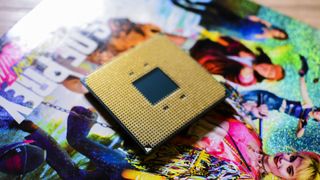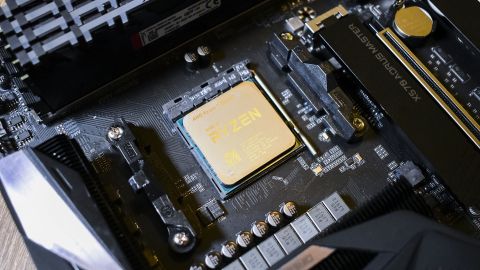TechRadar Verdict
The AMD Ryzen 7 3800XT is only a slight improvement over the existing Ryzen 7 3800X. However, because it slots in at the same price point, folks that haven't upgraded to a 3rd-generation Ryzen chip are essentially getting a free boost to performance – as long as you can live without an included cooler.
Pros
- +
Better performance
- +
Same price as Ryzen 7 3800X
- +
Increased gaming performance
Cons
- -
No included cooler
- -
Higher temps and power consumption
Why you can trust TechRadar
The AMD Ryzen 7 3800XT arrives exactly one year after the rest of the AMD Ryzen 3000 lineup, bringing with it a refined 7nm Zen 2 architecture and greater single-core performance at the same price – though without an included CPU cooler.
This all means that the 3800XT, along with the AMD Ryzen 5 3600XT and Ryzen 9 3900XT, sort of serve as a stopgap between AMD Ryzen 3000 and AMD Ryzen 4000. But, more importantly, these processors close the gap between Intel and AMD when it comes to single-core performance, which makes these chips some of the best processors for gaming right now.

Price and availability
The AMD Ryzen 7 3800X should be seeing general availability starting on July 7, and will set you back $399 (about £320, AU$570). That's the same price point as the AMD Ryzen 7 3800X, which comes in right now for $399 (£349, AU$645).
That sounds like a pretty sweet deal, but there's a caveat: there's no included cooler. This is both a blessing and a curse. With the higher heat generated by the increased TDP, you really should be going with an aftermarket cooler either way, which makes the cooler a waste of space.
However, it's still a thing you don't get, and the included Wraith Prism cooler that you get with the AMD Ryzen 7 3800X is genuinely useful for troubleshooting, especially when you're first building your PC and you just want to make sure everything works.
There likely aren't many people out there who absolutely need an included cooler with this class of processor – Intel has been selling its Core i7 chips without a cooler for a while – but it's still something to be aware of.
The AMD Ryzen 7 3800XT directly competes with the Intel Core i7-10700K, which can be found for just a bit more cash right now at $409 (£398, AU$749). Now, we haven't actually had a chance to review the 10700K ourselves, but while both it and the Ryzen 7 3800XT don't come with a cooler, Intel's chip comes with an integrated GPU, which can be useful for troubleshooting graphics problems when you don't have a spare graphics card lying around.
Unlike its little sibling, the Ryzen 5 3600XT, the value story isn't very clear. You're going to have to decide whether you are going to go AMD or Intel, both of which have their advantages and disadvantages, though we would recommend Team Red, thanks to the PCIe 4.0 compatibility that Team Blue still hasn't adopted.















Features and chipset
These new AMD Ryzen 3000XT processors are based on the same 7nm Zen 2 architecture featured in the rest of the Ryzen 3rd generation lineup, but there have been some enhancements made.
AMD has been hard at work improving the architecture since it first launched in July 2019, and was able to squeeze some slightly higher frequencies out of the silicon without substantially raising power consumption and temperatures.
That's not to say that there aren't increased temperatures and power consumption though – the Ryzen 7 3800XT consumes 122.85W at peak consumption compared to the Ryzen 7 3700X's 90.18W (we don't have an AMD Ryzen 7 3800X to test). That of course results in higher temperatures, with the 3800XT peaking at 78.5C compared to the 3700X's 72.6 – so nothing drastic.
That boost in power consumption does result in a boost in turbo clocks, though, with the 3800XT reaching up to 4.7GHz, whereas the vanilla 3800X only reaches up to 4.5GHz. That's a small boost of 200MHz, but it's still a faster frequency.
And, again, even a full year after the AMD Ryzen 3000's initial release date, it remains the only desktop platform that supports PCIe 4.0. This may not seem like a huge deal right now, but a couple years down the line it's going to be incredibly important – and thanks to AMD's historically long socket support, this platform should last quite a while.






Performance
This is the system we used to test desktop CPU performance:
AMD:
CPU Cooler: Cooler Master Masterliquid 360P Silver Edition Graphics card: Nvidia GeForce RTX 2080 Ti
RAM: 32GB HyperX Predator RGB @ 3,000MHz Motherboard: X570 Aorus Master
SSD: ADATA XPG SX8200 Pro @ 1TB
Power Supply: Phanteks RevoltX 1200
Case: Praxis Wetbench
Intel 10th Gen:
CPU Cooler: Cooler Master Masterliquid 360P Silver Edition
Graphics card: Nvidia GeForce RTX 2080 Ti
RAM: 32GB HyperX Predator RGB @ 3,000MHz
Motherboard: MSI MEG Z490 Godlike
SSD: ADATA XPG SX8200 Pro @ 1TB
Power Supply: Phanteks RevoltX 1200
Case: Praxis Wetbench
Intel 9th Gen:
CPU Cooler: Cooler Master Masterliquid 360P Silver Edition
Graphics card: Nvidia GeForce RTX 2080 Ti
RAM: 32GB HyperX Predator RGB @ 3,000MHz
Motherboard: MSI MEG Z390 ACE
SSD: ADATA XPG SX8200 Pro @ 1TB
Power Supply: Phanteks RevoltX 1200
Case: Praxis Wetbench
Reviewing the AMD Ryzen 7 3800XT without access to a Ryzen 7 3800X is definitely an interesting experience, but we do have the 3700X, which according to the incredibly in-depth 3800X review over at Tom's Hardware is only slightly slower and usually within margin of error with stock settings.
It shouldn't be too surprising, then, that the 3800XT has a substantial 4% boost in single-core performance and a more impressive 6% boost in the single-core and multi-core Cinebench R20 tests, respectively. This is also reflected in the 3DMark Time Spy CPU test, where the Ryzen 7 3800XT scores 10,265 points to the 3700X's 10,014 points – a 3% jump.
In all of our gaming tests, however, the AMD Ryzen 7 3800XT was about equal with the Intel Core i9-10900K, except for the Time Spy CPU test, where Intel's chip had it beat by a whopping 26%.
Ultimately, the performance gains here aren't mind-blowing, but they're not necessarily supposed to be. AMD is positioning these Ryzen 3000XT processors to essentially replace the existing chips at the same price point. And, while the loss of an included cooler might sting for some, more performance at the same price isn't a bad thing – however minor the improvement is.
Just don't expect this thing to wipe the floor with existing processors – it's essentially an overclocked AMD Ryzen 7 3800X.
Intel did try something like this back in 2019 with the Core i9-9900KS, but unlike that processor, which came with a pretty substantial price increase, as it was a "special edition", this processor is for folks that haven't upgraded to AMD Ryzen 3rd Generation yet.

Final verdict
The AMD Ryzen 7 3800XT is a pretty minor release, all things considered. You're getting around a 3-5% boost in single-core performance, which uplifts multi-core by about the same. That's not exciting by any means, but it's fine.
If you've been on the fence about picking up an AMD Ryzen 3000 processor, and you're about to do it anyways, there's no reason not to go for the AMD Ryzen 7 3800XT if you had your eyes on a Ryzen 7 or Intel Core i7 processor.
Likewise, if you didn't really feel the urge to upgrade to Ryzen 3000 already, this won't be enough to convince you to make the jump now.
Bill Thomas (Twitter) is TechRadar's computing editor. They are fat, queer and extremely online. Computers are the devil, but they just happen to be a satanist. If you need to know anything about computing components, PC gaming or the best laptop on the market, don't be afraid to drop them a line on Twitter or through email.

